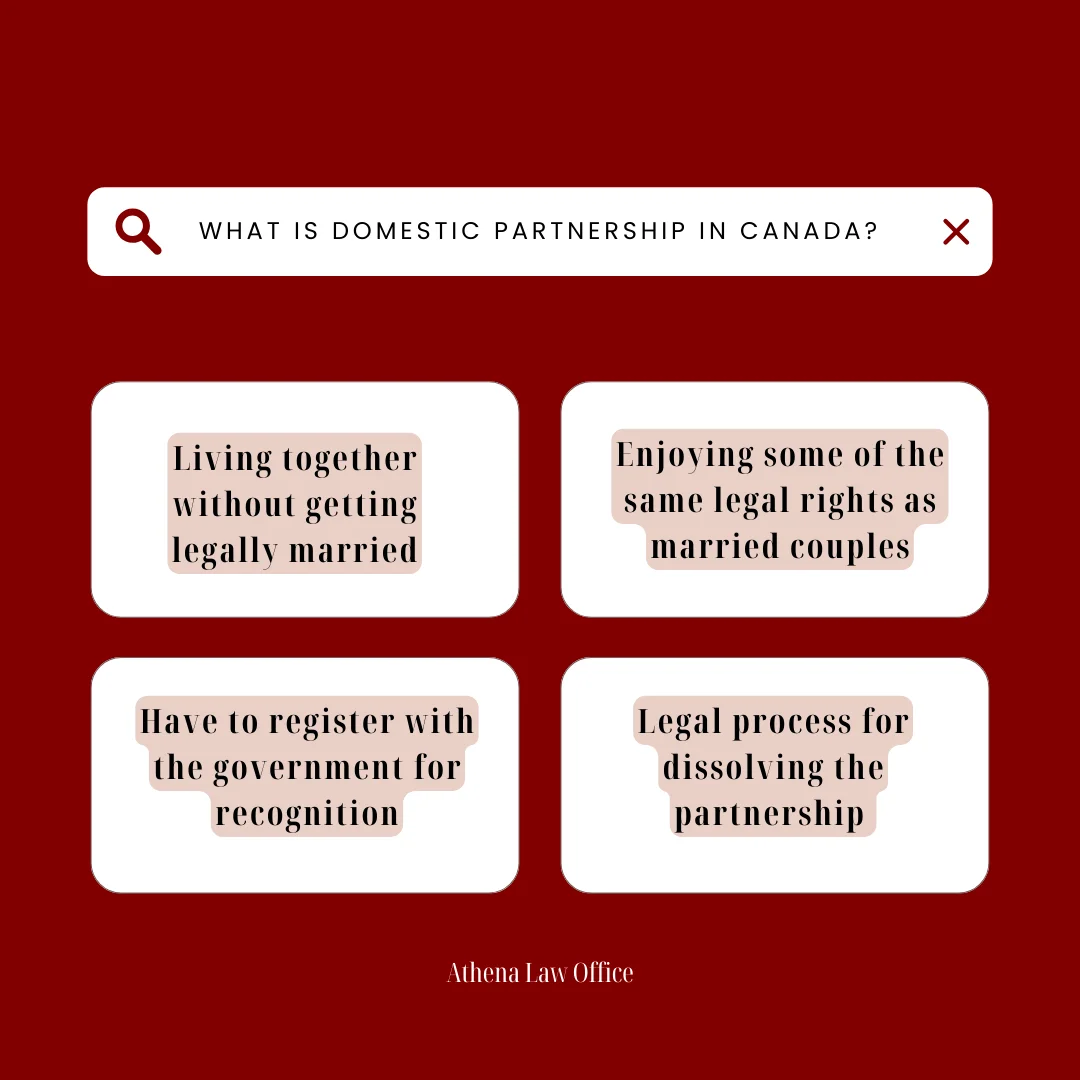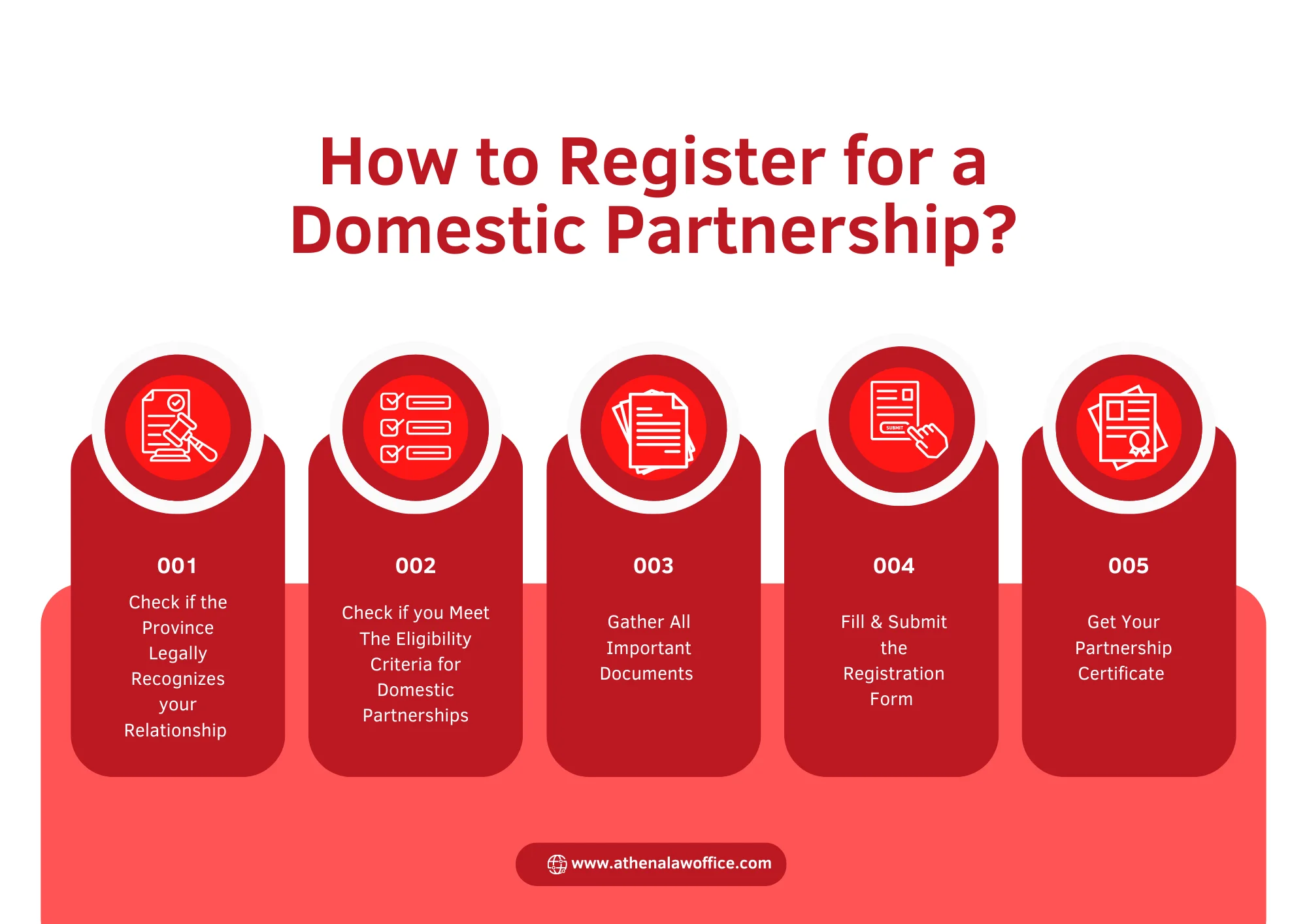Are you considering a domestic partnership with your partner in Canada? Well, it is crucial to understand the domestic partnership meaning and the various legal obligations and rights that come with it as you share a domestic life with your partner.
A domestic partnership in Canada varies between each province and territory. Below is a complete guide by our family lawyers in Whitby to help you understand this concept.
Domestic Partnership Meaning in Canada Explained

Domestic partnership meaning in Canada, extends to couples that want to live together without getting married but still have some of the legal rights that married couples do, such as health benefits.
Such a partnership is also a formal legal relationship that the couple has to register with the government.
Here are some important points to note when understanding domestic partnership meaning:
- Domestic partnership vs. common-law relationship are two different things (we will discuss this in detail below)
- Canada recognizes domestic partnerships at the provincial level, so you have to check the legal rules where you live
- If you want to register for a domestic partnership, you will have to meet certain requirements (we will discuss this too)
- There is a legal process just live divorce for married couples to dissolve their domestic partnership
Now that you have some idea about the domestic partnership meaning, it is crucial to understand it in detail before making any decisions. So, keep reading.
How Domestic Partnerships Are Legally Recognized in Canada?
While the domestic partnership meaning is clear, you may wonder about the legal recognition and rights of such a partnership. Remember that while Canada recognizes this type of partnership, it varies between each province and territory.
We will break the territories and laws down to help you understand the domestic partnership in detail:
Federal Laws Pertaining to Domestic Partnerships in Canada
One key thing to note is that the federal government in Canada does not have a specific law that recognizes such a partnership.
However, when we look at other laws that apply to domestic partners, we can see that the country does recognize people living together as spouses for the purpose of the obligations and benefits they receive.
For example, the Canada Pension Plan and Income Tax Act recognize the existence of common law partners that live as spouses for benefits.
If you want the government to recognize you as a common law partner, then you must live together in a conjugal relationship for at least one year.
Provincial Laws for Domestic Partnership in Canada
Mainly, provincial laws in Canada govern domestic partnerships. For example, in Ontario, the province legally recognizes common-law partners, and they have the same benefits and legal rights as married couples.
These couples have the right to share property acquired during their common-law relationship and the right to spousal support. Remember that the domestic partnership meaning is still not fully recognized in these territories.
On the other hand, Nova Scotia has specific legislation that recognizes domestic partnerships. An important point to note here is that any law that governs relationships can be complex and will be applicable to you differently, depending on your specific situation.
So, if you want more clarification regarding domestic partnership meaning and everything it entails, you must connect with family lawyers in Whitby, Ontario, to help you with what you require.
How to Register for a Domestic Partnership?

There are certain steps you must follow after knowing the domestic partnership meaning. If you want to opt for domestic partnership registration, here is what you need to do:
1. Check if the Province Legally Recognizes your Relationship
You can’t register for a domestic partnership in all provinces in Canada. For example, Quebec and Ontario don’t even have a registry for this purpose.
However, if you want such a partnership while living there, then you can opt for a cohabitation agreement to ensure the protection of your legal rights and responsibilities.
2. Check if you Meet The Eligibility Criteria for Domestic Partnerships
If you live in a province that recognizes domestic partnership meaning and relationship, then you will have to meet the eligibility criteria to register yourself.
Nova Scotia legally recognizes domestic partnerships, and you have to meet the following requirements to register for a domestic partnership:
- You and your partner must be at least 19 years old
- You must have been living in the province for the last three months
- There is no marriage contract between you and your partner
- You and your partner must be living in a conjugal relationship
Once you meet these criteria for domestic partnership, it is time to move on to the next step.
3. Gather All Important Documents
The documents you need to submit to register for a domestic partnership will vary depending on the province you live in. However, there are some documents everyone needs to provide.
These include the following:
- Identification documents
- Proof of residency
- Declaration of the status of your relationship
For other specific documents, it is important for you to check with your province. Then, you can submit all of them together.
4. Fill & Submit the Registration Form
There is a registration form you have to fill out to register your domestic partnership. You may find this form in the government office or online, depending on the province.
It is important you check the local government office to gain more clarification on domestic partnership meaning, and how you can register. You can also connect with family lawyers in Whitby to help you during the registration process.
Then, be sure to submit the form at the right place. You might have to incur a fee for this process.
5. Get Your Partnership Certificate
Finally, the government office will process your registration documents and provide you with a domestic partnership certificate.
Such a certificate will entitle you to various legal benefits and rights that married couples also receive. Some of these can include the following:
- Healthcare benefits
- Inheritance rights
- Making medical decisions for your partner
- And more
The exact rights and benefits will depend on the province.
Does a Domestic Partnership Affect Taxes?
The Canada Income Tax Act states that common-law partners will be treated the same as married couples. Because of this, common law partners can:
- Clam provincial and spousal amount tax credit if your partner supports you financially during the year
- Combine charitable donations and medical receipts
- Contribute to spousal RRSP
Common law partners can also transfer the unused tax credits to their partners to decrease the household tax rate. Remember that these rules may not be applicable to your domestic partnership.
We recommend you connect with our family lawyers in Whitby or call your government local body for more clarification on tax matters.
What is the Process of a Dissolution of a Domestic Partnership?
The process of domestic partnership dissolution will vary between each province. For example, in Nova Scotia, you can fill out an online form to terminate your domestic partnership.
However, even for this, you have to meet the following criteria. Partners will be eligible to terminate the domestic partnership if:
- You or your partner marry someone else
- You file for a separation agreement with the courts
- Both of you have lived apart for less than a year and have signed an affidavit
- You have lived separately and apart for over a year and have filed an affidavit
Once you meet these criteria, you can fill out the application form and submit the payment. Then, you need to send the documents and application to the relevant government body.
Finally, the registry will terminate your partnership, and this will permanently remain in the registry.
It will take between two and three months to terminate the domestic partnership.
The exact process will vary based on your province, so be sure to check with your local government office.
Domestic Partnership Vs. Marriage
| Differences | Domestic Partnership | Marriage |
| Legal Protections | No automatic legal rights and protections in marriage | Can file joint tax returns Inherit property without a will Receive spousal support after separation |
| Formalities | Must register with the government | Obtain a marriage license and have a ceremony |
| Recognition | Domestic partnerships are not recognized everywhere in Canada | Marriage is recognized everywhere |
| Children | Same as marriage | Can adopt children, apply for parenting time and responsibility, and decide how to bring up the child |
| Termination | It may not require a formal legal process, as it will end when one partner marries someone else | Divorce requires a legal process to divide assets and properties |
While there may be similarities between the domestic partnership meaning and marriage, there are important differences. For example, a domestic partnership is an alternative to marriage for couples in a committed relationship.
The domestic partnership allows you to define your relationship status without the process of marriage. Such a term varies throughout the world.
Other places also refer to a domestic partnership as a civil partnership, civil union, common law marriage, and more.
When it comes to domestic partnership vs. marriage, everything from the legal benefits to the social benefits will vary. Remember that a domestic partnership does not offer the same level of federal and legal protection as a marriage.
FAQs
What is considered a domestic partner in Canada?
A domestic partnership is a formal legal relationship that has been registered with the government. It allows the couple to have some rights and protections that married couples have without the title.
What does it mean to be in a domestic partnership relationship?
It is the personal or legal recognition of the marriagelike or committed partnership of the couple. It is similar to being married without the legal formalities, rights, and protections.
Who is considered a common-law partner in Canada?
A common law partner in Canada includes two people who have been cohabiting for at least one year and have combined affairs while setting up their household in one dwelling. Usually, this is what the federal government in Canada defines as a common-law partnership.
What is the difference between marriage and common law in Canada?
Marriage takes place when two people have legally married one another. On the other hand, common law is when two unmarried people live together for at least a year and have joined their household and other things.
Final Thoughts
That was your complete guide to understanding the domestic partnership meaning by our family lawyers in Whitby. If you still require clarification or need someone to guide you through this process, you can contact our law office in Scarborough.
We will be more than happy to help you and ensure that you have everything you need within the bounds of a domestic partnership. For more information, contact us today.
Author Profile

- Barnett Law is a trusted and knowledgeable lawyer in Scarborough. Her expertise spans real estate law, family law, adoptions and fertility law. A lawyer by profession and a humanitarian by heart, Athena Narsingh Barnett wants to help people become more familiar with the legal system and be well-informed to make important legal decisions.
Latest entries
 legal guidanceNovember 12, 2025How To Avoid Land Transfer Tax Ontario?
legal guidanceNovember 12, 2025How To Avoid Land Transfer Tax Ontario? legal guidanceOctober 31, 2025How Much Is Land Transfer Tax In Ontario?
legal guidanceOctober 31, 2025How Much Is Land Transfer Tax In Ontario? Family LawOctober 27, 2025How Much Does A Divorce Cost In Ontario In 2025?
Family LawOctober 27, 2025How Much Does A Divorce Cost In Ontario In 2025? Family LawOctober 22, 2025Divorce Rate In Canada 2025: Top Divorce Statistics To Know
Family LawOctober 22, 2025Divorce Rate In Canada 2025: Top Divorce Statistics To Know

